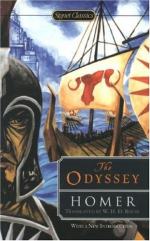|
This section contains 366 words (approx. 2 pages at 300 words per page) |
Notes on the Odyssey by Homer
When Book 12 marches into play, the readers learn from the way of Homer, that while Odysseus may be strong and smart, his crew is stupid and insolent and they do not obey Odysseus's wise and educated cautions. Odysseus tells the Phaeacians that he returned to Circe. The way Homer tells this book brings out the hero concept so much because he writes of how Odysseus's crew messes up so bad but Odysseus is the one who ultimately suffers in the end because the men of his ship die instantly. Odysseus is the hero because he took hits that he did nothing to inflict, and therefore he is losing but is still the hero.
Book number sixteen brings on a lot of literary devices that Homer craftily uses. Homer uses visual imagery to describe how majestic Odysseus looked to Telemachus when Athena changed his appearance. This is important because it shows Odysseus as the hero and being all great. Homer also uses other literary devices such as mood to show how fervent and worried the suitors are of Telemachus's return.
|
This section contains 366 words (approx. 2 pages at 300 words per page) |


